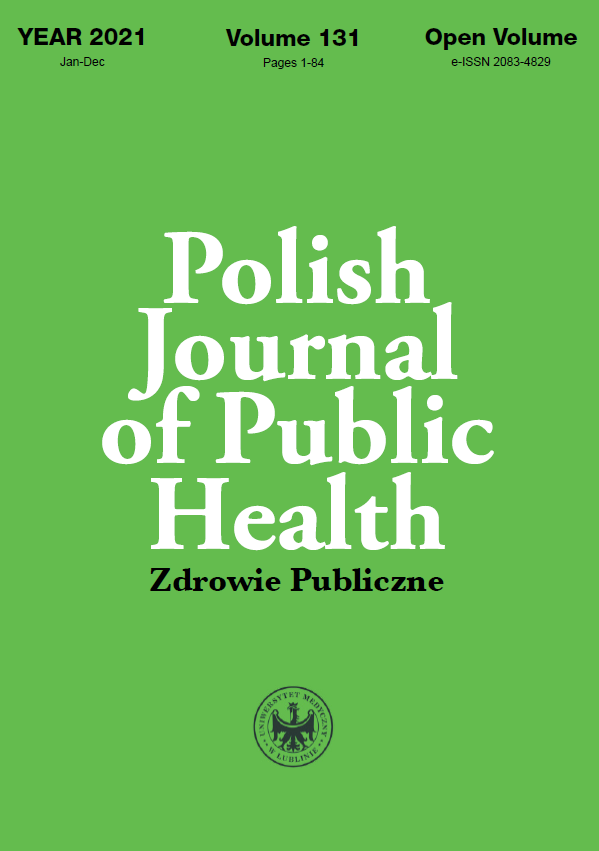The attitude of students of Lublin universities to vaccination in the COVID-19 period
DOI:
https://doi.org/10.2478/pjph-2021-0004Keywords:
vaccination, COVID-19 pandemic, adverse reaction to vaccinationAbstract
Introduction. Vaccines are one of the greatest achievements of modern medicine. The compulsory vaccination schedule was introduced in Poland in the 1950s. Vaccinations are sometimes followed by adverse effects (ARV). The most common symptoms of ARV are swelling, redness and soreness at the injection site, usually lasting up to 24 hours after vaccination.
Aim. The aim of our study was to check the attitude of students of Lublin universities to vaccination in the COVID-19 period.
Material and methods. In December 2020 we conducted an anonymous and voluntary survey. It was uploaded and shared on the Google online survey platform. A total of 75 students participated in the study.
Results. The respondents were 56 women and 19 men. Out of them 30 (40%) were from Medical University of Lublin (MUL), 15 (20%) from University of Life Sciences (ULS), 21 from University of Marie Sklodowska-Curie (UMCS) (28%) and 9 from Lublin University of Technology (LUT) (LP) (12%). Their mean age was 22 years ± 1.1 (SD). More than half of the respondents were not interested in compulsory vaccinations before the COVID-19 pandemic. Only about 35% (18 persons) of people expressed a positive opinion about vaccines and they were students of MUL. Although 80% of respondents answered that the anti COVID-19 vaccine is necessary, but 81% thought that Poles had not enough knowledge about the vaccine. Students themselves most often obtained information about vaccines and ARVs from Internet.
Conclusion. Students of MUL were the most enthusiastic about mandatory vaccinations and anti COVID-19 immunization. Poles need more reliable information about vaccine to change their attitude towards it.
References
1. D’Amelio E, Salemi S, D’Amelio R. Anti-Infectious Human Vaccination in Historical Perspective. Int Rev Immunol. 2016;35(3):260-90.
2. Talaga K, Bulanda M. Odo Bujwid – an eminent Polish bacteriologist and professor at the Jagiellonian University. Folia Med Cracov. 2014;54(4):15-20.
3. Rumik A, Paradowska-Stankiewicz I, Rudowska J, Wiktor A. Pertussis In Poland in 2017. Przegl Epidemiol. 2019;73(3):289-95.
4. Słońska Z, Janusik B. Ocena wykonawstwa obowiazkowych szczepień ochronnych w Polsce w 1986 r. Przegl Epidemiol. 1988;42(2):147-53.
5. Borkowski L, Drąg M, Fal AM, et al. Nauka przeciw pandemii. Szczepienie przeciw COVID-19. Innowacyjne technologie i efektywność. Warszawa, 21 grudnia 2020. www.naukaprzeciwpandemii.pl]
6. Spencer JP, Pawlowski RHT, Thomas S. Vaccine dverse Events: Separating myth from reality. Am Fam Physician. 2017;95(12):786-94.
7. Kimmel SR. Vaccine adverse events: separating myth from reality. Am Fam Physician. 2002;66(11):2113-20.
8. Tosun S, Olut AI, Tansug N. Adverse effects of single-component measles vaccine in school children. Vaccine. 2017;35(52):7309-11.
9. Fridman D, Monti A, Bonnet MC, et al. Safety of a second dose of varicella vaccine administered at 4 to 6 years of age in healthy children in Argentina. Hum Vaccin. 2011;7(10):1066-71.
10. Regulation of the Minister of Health of December 21, 2010 on adverse vaccination reactions and the criteria for their diagnosis.
11. Smith DR. Herd Immunity. Vet Clin North Am Food Anim Pract. 2019;35(3):593-604.
12. Darden PM, Thompson DM, Roberts JR, et al. Reasons for not vaccinating adolescents: National Immunization Survey of Teens, 2008-2010. Pediatrics.2013;131(4):645-51.
13. Kajetanowicz A, Kajetanowicz A. Why parents refuse immunization? Wiad Lek. 2016;69(3 Pt 1):346-51.
14. Wojtyniak B, Goryński P. Sytuacja zdrowotna ludności Polski i jej uwarunkowania. Warszawa: Narodowy Instytut Zdrowia Publicznego – Państwowy Zakład Higieny; 2018.
15. Magdzik WW. Hepatitis B epidemiology in Poland, Central and Eastern Europe and the newly independent states. Vaccine. 2000;18 Suppl 1:S13-6.
16. Stępień M, Zakrzewska K, Rosińska M. Significant proportion of acute hepatitis B in Poland in 2010-2014 attributed to hospital transmission: combining surveillance and public registries data. BMC Infect Dis. 2018;18(1):164.
Downloads
Published
Issue
Section
License
Copyright (c) 2021 Polish Journal of Public Health

This work is licensed under a Creative Commons Attribution-NonCommercial-NoDerivatives 3.0 Unported License.


